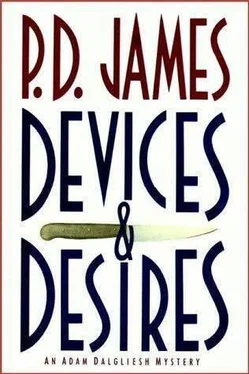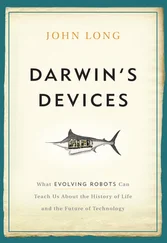'My brother, of course, gave me the news of the murder as soon as he got home last night. I can't help you about Hilary Robarts's death, I'm afraid. I was at home the whole of yesterday evening and saw and heard nothing.
But I can tell you a little about her portrait. Would you and Sergeant Oliphant care for coffee?'
Rickards would have cared; he found himself unexpectedly thirsty; but he declined for both of them. The invitation had sounded perfunctory and he hadn't missed her quick glance towards the desktop stacked with orderly piles of printed pages and a typewritten manuscript. It looked as if they had interrupted her in the business of proofreading. Well, if she was busy, so was he. And he found himself irritated, unreasonably, he felt, by her self-possession. He hadn't expected to find her in hysterics or under sedation for grief. The victim wasn't her next of kin. But the woman had worked closely with Alex Mair, had been a guest at Martyr's Cottage, had, according to Daigliesh, dined there only four days ago. It was disconcerting to find that Alice Mair could sit quietly correcting proofs, a job which surely required concentrated attention. The killing of Robarts had taken considerable nerve. His suspicion of her was hardly serious; he didn't really see this as a woman's crime. But he let suspicion enter his mind like a barb and lodge there. A remarkable woman, he thought. Perhaps this interview was going to be more productive than he had expected.
He asked: 'You keep house for your brother, Miss Mair?'
'No, I keep house for myself. My brother happens to live here when he is in Norfolk, which naturally is for most of the week. He could hardly administer Larksoken Power Station from his flat in London. If I'm at home and cook dinner he usually shares it. I take the view that it would be unreasonable to demand that he make himself an omelette merely to affirm the principle of shared domestic responsibilities. But I don't see what relevance my housekeeping arrangements have to Hilary Robarts's murder. Could we, perhaps, get on to what happened last night?'
They were interrupted. There was a knock at the door and, without an apology, Alice Mair got up and went through to the hall. They heard a lighter, feminine voice and a woman followed her into the kitchen. Miss Mair introduced her as Mrs Dennison from the Old Rectory. She was a pretty, gentle-looking woman, conventionally dressed in a tweed skirt and twinset, and was obviously distressed. Rickards approved both of her appearance and of the distress. This was how he expected a woman to look and behave after a particularly brutal murder. The two men had got up at her entrance and she took Oliphant's chair while he moved one for himself from the kitchen table.
She turned to Rickards impulsively: 'I'm sorry, I'm interrupting, but I felt I had to get out of the house. This is appalling news, Inspector. Are you absolutely certain that it couldn't have been the Whistler?'
Rickards said: 'Not this time, madam.'
Alice Mair said: 'The timing's wrong. I told you that when I rang early this morning, Meg. The police wouldn't be here now if it wasn't. It couldn't have been the Whistler.'
'I know that's what you said. But I couldn't help hoping that there'd been a mistake, that he'd killed her and then himself, that Hilary Robarts was his last victim.'
Rickards said: 'In a sense she was, Mrs Dennison.'
Alice Mair said calmly: 'I think it's called a copycat murder. There's more than one psychopath in the world and that kind of madness can be infectious, apparently.'
'Of course, but how horrible! Having started, will he too go on, like the Whistler did, death after death, no one feeling safe?'
Rickards said: 'I shouldn't let that worry you, Mrs Dennison.'
She turned to him almost fiercely. 'But of course it worries me! It must worry us all. We've lived so long with the horror of the Whistler. It's appalling to think that it's started all over again.'
Alice Mair got up. 'You need coffee, Meg. Chief Inspector Rickards and Sergeant Oliphant have declined but I think we need it.'
Rickards wasn't going to let her get away with that. He said firmly: 'If you're making it, Miss Mair, I think I'll change my mind. I'd be glad of a coffee. You too no doubt, Sergeant.'
And now, he thought, there'll be a further delay while she grinds beans and no one can talk above the noise. Why can't she just pour boiling water on coffee grains like everyone else?
But the coffee, when it did come, was excellent and he found it unexpectedly comforting. Mrs Dennison took her mug in her hands and cradled it like a child at bedtime. Then she put it down on the hearth and turned to Rickards.
'Look, perhaps you'd rather I went. I'll just have my coffee and then go back to the rectory. If you want to talk to me I'll be there for the rest of the day.'
Miss Mair said: 'You may as well stay and hear what happened last night. It has its points of interest.' She turned to Rickards. 'As I told you, I was here the whole of the evening from half-past five. My brother left for the power station shortly after 7.30 and I settled down to work on my proofs. I switched on the answerphone to avoid interruptions.'
Rickards asked: 'And you didn't leave the cottage for any purpose during the whole of the evening?'
'Not until after half-past nine when I left for the Blaneys'. But perhaps I could tell the story in sequence, Chief Inspector. At about ten past eight I switched off the machine thinking that there might be an important call for my brother. It was then I heard -George Jago's message that the Whistler was dead.'
'You didn't ring anyone else to let them know?'
'I knew that wasn't necessary. Jago runs his own information service. He'd make sure that everyone knew. I came back into the kitchen and worked on my proofs until about half-past nine. Then I thought that I'd collect Hilary Robarts's portrait from Ryan Blaney. I'd promised to drop it in at the gallery in Norwich on my way to London and I wanted to make an early start next morning. I tend to be a little obsessive about time and didn't want to go even a short distance out of my way. I rang Scudder's Cottage to let him know that I was collecting the portrait but the number was engaged. I tried several times and then got out the car and drove over. I'd written a note to him to slip through the door telling him that I'd taken the picture as arranged.'
'Wasn't that a little unusual, Miss Mair? Why not knock at the cottage and collect it from him personally?'
'Because he had taken the trouble to tell me, when I first saw it, precisely where it was kept and where I could find the light switch to the left of the door. I took that as a reasonable indication that he didn't expect, or indeed want, to be disturbed by a call at the cottage. Mr Dalgliesh was with me at the time.'
'But that was odd, wasn't it? He must have thought it was a good portrait. He wouldn't wish to exhibit it otherwise. You'd think he'd want to hand it over personally.'
'Would you? It didn't strike me that way. He's an extremely private man, more so since the death of his wife. He doesn't welcome visitors, particularly not women who might cast a critical eye on the tidiness of the cottage and the state of the children. I could understand that. I wouldn't have welcomed it myself.'
'So you went straight to his painting shed? Where is that?'
'About thirty yards to the left of the cottage. It's a small wooden shack. I imagine that it was originally a washhouse or a smoking shed. I shone my torch on the path to the door, although that was hardly necessary. The moonlight was exceptionally bright. It was unlocked. And if you're now about to say that that, too, was odd, you don't understand life on the headland. We're very remote here and we get into the habit of leaving doors unlocked. I don't think it would ever occur to him to lock his painting shed. I switched on the light to the left of the door and saw that the picture wasn't where I expected.'
Читать дальше












